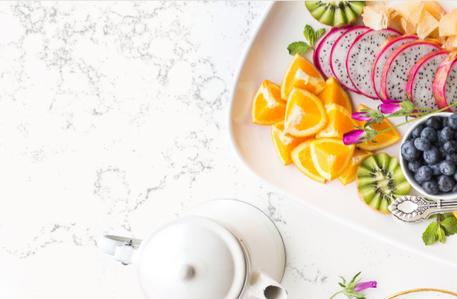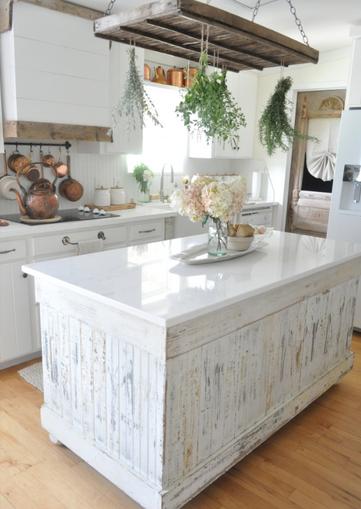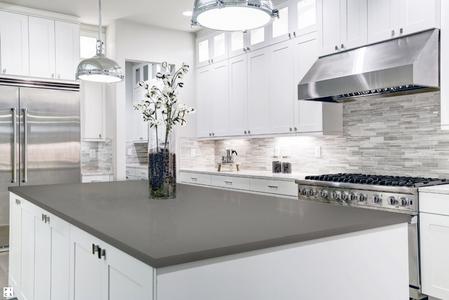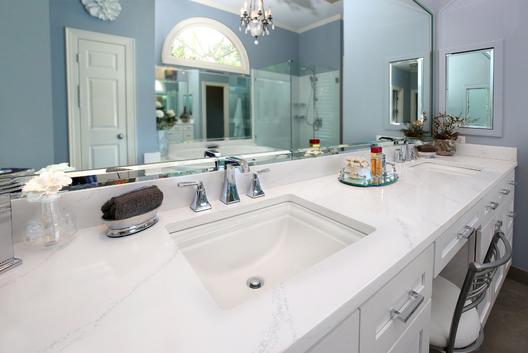HanStone Care and Maintenance guide
 HanStone is a hard, non porous, natural quartz surface that makes cleaning quick and easy. With proper Care & Maintenance, and some industry Tips & Tricks, hard-to-clean stains, spills and messes can now be a thing of the past.
HanStone is a hard, non porous, natural quartz surface that makes cleaning quick and easy. With proper Care & Maintenance, and some industry Tips & Tricks, hard-to-clean stains, spills and messes can now be a thing of the past. Daily Cleaning
HanStone Recommends:
• Option 1 -Soap & Water
• Option 2 – Rubbing Alcohol & Water solution
Tip: Always use a non-abrasive cloth when cleaning to avoid dulling your surface.
Natural Oils and Synthetic Oils 
Olive Oil, Canola Oil, etc.
Oils on any counter can leave the finish looking messy, smudged and reflect light unpleasantly.
HanStone Recommends:
• Option 1 – Soap & Water
• Option 2 -Use a Mild, Alcohol based degreaser such as Simple Green All Purpose Cleaner or Rubbing Alcohol.
Food Coloring
Herbs & Spices, Red Wine, Mustard, Coffee & Tea, Fruits
HanStone Recommends:
• Option 1 -Soap & Water or Rubbing Alcohol & Water Solution
• Option 2 -Soak a cloth with 50% bleach concentration. Leave on top of stain for 10 minutes. If stain persists, reapply but do not leave on for longer than 30 minutes.
• Option 3 -Apply Hydrogen Peroxide max 30% concentration. Then rinse and wipe the surface with water.
Cosmetics 
Hair Shampoo, Creams, Makeup
Staining resulting from Cosmetic Products can make anyone panic. Not to worry, we can help!
HanStone Recommends:
• Option 1 -Soap & Water
• Option 2 – Apply Hydrogen Peroxide max 30% Concentration then rinse and wipe with water.
• Option 3 -Rubbing alcohol
Tip: Please remove any residue from the Hydrogen Peroxide solution after cleaning to avoid any changes to HanStone’s brilliant surface.
Metals
Kitchen Tools, Metal Pots and Knife Marks
Noticing Metal Marks on a quartz surface can often be confused for scratches. Such metal marks can be easily removed using simple methods.
HanStone Recommends:
• A White Latex Eraser. Delicately rub the eraser on the affected area, once the stain is gone, clean the surface with one of the daily cleaning solutions as recommended.
Tip: The Rule of thumb is to never apply pressure that is heavier than the natural weight of your hand. Otherwise, you can cause dull spots.
Strato
Metal Rust Stains
 HanStone Recommends:
HanStone Recommends:
• Step 1 -Soak a cloth with Oxalic Acid or Bar Keepers Friend and apply on top of the stain for 10 minutes.
• Step 2 – If the stain persists, reapply but do not leave on longer than 30 minutes.
• Step 3 -Once stain is removed, clean surface with water alone or a soap & water solution.
Ink
Water Based Markers -Print Transfer Marks
HanStone Recommends:
• Option 1 -Gently apply rubbing alcohol to the stain. Stain should lift.
• Option 2 -For stubborn stains, soak a cloth with 50% bleach concentration. Leave on top of stain for 10 minutes. If the stain persists, reapply but do not leave on for longer than 30 minutes.
Hard Water Deposits
 HanStone Recommends:
HanStone Recommends:
• Option 1 -Cleaning vinegar
• Option 2 – Non-abrasive scale remover solution
Silicone
HanStone Recommends:
• Option 1 -Rubbing Alcohol
• Option 2 -DAP silicone remover
Soap Stains
HanStone Recommends:
• Mild, Alcohol Based degreaser such as Simple Green All Purpose Cleaner.
Preventing Damages
Heat
HanStone Quartz is designed to be resistant to heat and can withstand exposure to normal cooking environment for brief periods of time without being damaged. Although it can withstands heat better than most surfacing materials on the market, all surfacing materials, including stone, can be damaged by extreme temperature changes, whether prolonged or sudden. Trivets and hot pads should always be used when placing hot skillets, pans, crock-pots or other heat generating kitchenware on the HanStone surface.
Scratches
HanStone Quartz’s durable surface is designed to withstand normal use. While it is resistant to scratches, cuts, and chipping, cutting directly on the quartz surface should be avoided. Using cutting boards and taking care not to drop or move heavy objects on the surface will help to ensure long-lasting beauty.
Chemical
Avoid exposing HanStone Quartz to any strong chemicals and solvents. It is important to note that some of these chemicals and solvents can be found in household items like paint removers, paint and stain strippers that contain trichlorethane or methylene chloride, nail polish removers, bleach, furniture cleaners, oil soaps, permanent markers or inks, and chemicals with high alkaline/PH levels (oven cleaners, drain openers, etc.).
Avoid using cleaning products that contain oils, powders or abrasives. Although long-term or frequent exposure must be avoided at all times, the following products may be used with short-term exposure (removing and rinsing immediately after application with water) to clean difficult stains or residues. Always handle such cleaning agents with care and rinse the applied surface with water completely afterwards.
